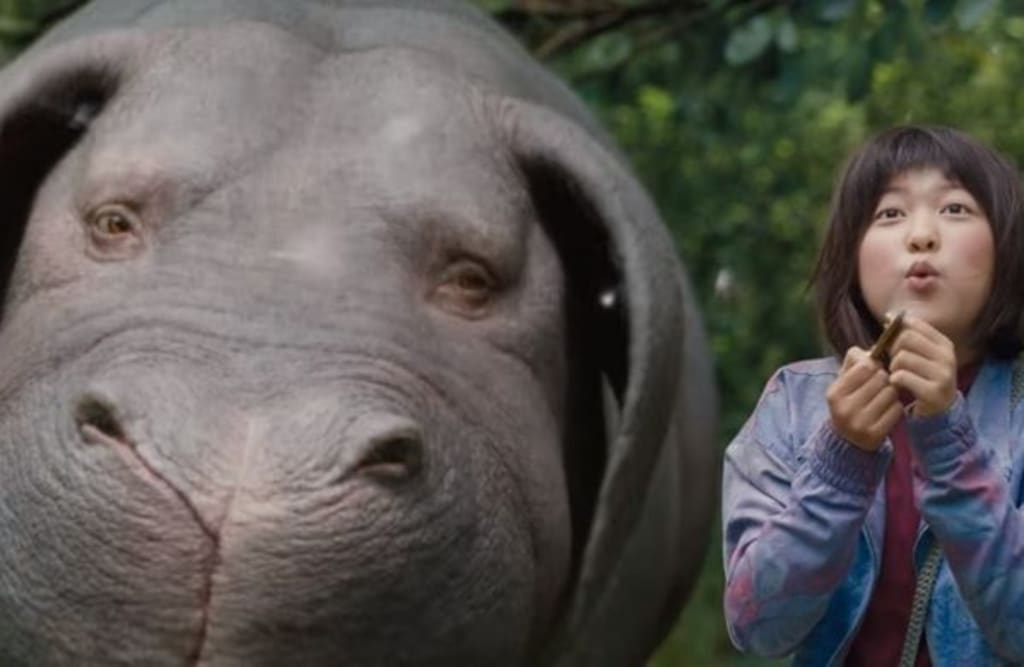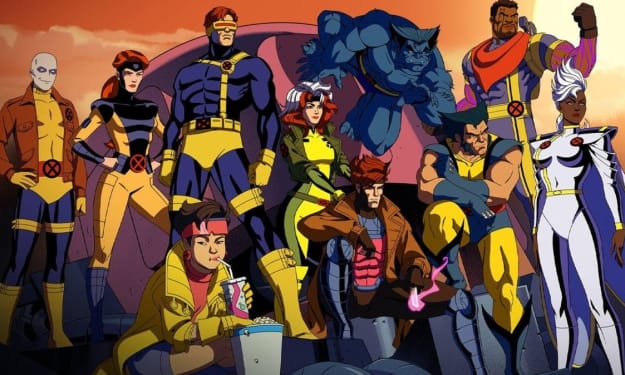The Issue I Have with 'Okja'
This piece contains spoilers.

Okay, so hear me out, Okja is a good film. I enjoyed the story, the cinematography and direction were excellent, and I enjoyed everyone's performances, the cast was great. However, there is a part of the film that just didn't sit with me well and I needed to write it down so it wouldn't plague my mind and keep me up until the early hours (like last night after watching it).
As I have said already in the subtitle, I will talk about specific parts of the film, mainly closer to the end, so if you want to watch the film, do so first because there are spoilers here. You have been warned.
So as a brief recap, the story is about a huge American corporation that is wanting to renovate the meat industry by producing "super pigs" in order to take over what is currently available to meat eaters. They do this by investing twenty-six of these bad boys to twenty-six lucky farmers from all corners of the globe. Ten years later, we are then introduced to Mija and her grandpa who were selected within the programme and they do an excellent job of raising the title character: Okja.
Okja is this wonderfully charming, naive, intellectual, and all around absolute cutie of a super pig that has grown within the mountainous woodland regions of South Korea, with very little "orthodox" farming practices to nurture her growth. This gentle giant that looks like a mixture of elephant, dog, and hippopotamus develops an unbreakable bond with Mija. They clearly have spent the ten years having more of a companionship rather than rearing a product of the meat industry. Two particularly early moments capture this wonderfully:
One is when Mija decides to take a shortcut on their way back home, and slips over a drastic drop off a cliff edge. Then quickly steps in Okja to the rescue, she takes control of the situation by grabbing the rope that Mija had hold of, she assesses the situation of how to keep Mija safe, and she sees a broken tree trunk, races across the cliff-face to then use the trunk as a pulley system, raising Mija to safety and Okja to drop into the canopy of the trees far below.
The second moment is very shortly after this altercation, Mija finds Okja where she had landed after falling from the cliff-face, to her surprise, Okja is fine and unscathed, and they have this incredibly tender moment of an embrace that shows that their relationship is so bonded, one you would find between dogs and owners.
These two scenes show the audience that Okja isn't just simply an animal bred for human consumption, she is more than this, and no doubt so are the other twenty-six that have been part of this ten-year experiment.
So far, any issues? No, at this point Bong Joon-ho has got me emotionally invested with the rest of the story, which is what all directors and writers want. They want you to care about the characters, otherwise, what's the point?
Anyway, inevitably the nasty corporation want to do what comes naturally to them, take away the character you now love and adore, and kill them for human consumption i.e to be any kind of meaty treats a meat eater would want. So begins Mija's long and dedicated mission, alongside the Animal Liberation Front (a real-life organization who disrupt corporations who harm animals) to save Okja and to expose the Mirando company and their abuse against the super pigs within the film.
This is ultimately most of the screen time within the film; how Mija will get Okja back and how the Animal Liberation Front will stop the Mirando company. And that's okay. It's what keeps the audience hooked onto the film. And right at the end, Mija is finally able to keep Okja and take her back to South Korea, hurrah and everyone rejoices in their reunion, right? Wrong.
Here are where the issues really stick out for me. If you haven't already guessed by the language I have used already, I am vegan. I chose to be vegan, purely because of the devastation the meat, dairy and egg industry causes all over the world in deforestation, ocean pollution, and ultimately, death. Every year, it is estimated that the meat (including fishing and "game" industries), dairy, and egg industry kill around 70 billion animals. Think about that for a moment. Seventy billion. Animals that, like you and me, were just existing. This isn't just speculation, this number is estimated from using statistics from farmers and companies all over the world who quantify animals and their suffering into products that then humans consume.
Anyway, I'm not here to recite facts/estimates blah blah blah to you because there are great films on Netflix and other platforms that you can watch that will give you this information. I just wanted to give you a slice of where my perspective is coming from and how it made me look at Okja in a different way that others may not have thought about or seen. (I reread here and realized below it creeps back in slightly, but it's part of my reasons so bear with me).
Okay, so there are some scenes in the film that show the terrors of the industry that are fairly in your face. The first instance we see this is when Okja is taken to be forcefully mated by a male super pig. This happens all the time in the meat/dairy/egg industry, animals are made to breed in order to increase "product". Sometimes this is done as portrayed in the film, by a male being made to mate with a female, but this sometimes takes longer and isn't always successful. So in most cases, they "milk" the male of his sperm and then use equipment to "artificially inseminate" the female. Basically turkey-basting the female's vagina full of sperm to produce offspring. What a job to have.
Another scene is at the slaughterhouse where Okja is taken to once the parade promoting the "new" and "exciting" meat is shown to the public. The audience sees the super pigs being prodded with electric cattle prods into the slaughterhouse, because, you know, no animal would willingly walk to their death. We see the super pigs being sliced and diced into various cuts, we see the workers slopping up pools of blood, that is everywhere. We see these lovable creatures being killed purely because there is demand. To be eaten, to be a product for humans. What I admire Joon-ho for is that he chose to show this to the audience, to show the truth about the industry that already exists in pretty much every corner of the world and every society that has animal corpses on their plates. These practices are not imaginary.
What really frustrated me about the film is that Mija, unlike the Animal Liberation Front, only wanted to save Okja, not the millions of other super pigs that desperately wanted to live, she only cared for Okja. And this is what was the focus of the wrap up of the end of the film. Mija and Okja reunited and to live happily-ever-after. As I already said, this is wrong. And it shows the flaw within Animal Liberation if done purely based on relationships rather than moral compass directing our intentions. Mija only wanted to liberate Okja because there was a bond there.
And for hours and hours after, all I could think about was the other super pigs who weren't loved enough or cared enough for, whose fate was death and consumption. Not being able to jump into glistening pools and lakes in the wilderness, not being able to feel summer breezes and to eat persimmons out of a guardian's hand. They wouldn't have that happy ending to their existence. And this is soberingly true for all animals who are brought into this world by humans within the industries that exist. Animals who are crammed into pens for years on end, crammed into trucks, then crammed into plastic trays and then crammed into mouths.
The moral of the film that I took is that we should be conscious of the decisions we take towards species that have just as much right to live and survive without our interference like we want for ourselves. But the only way that can be done with effect is by not funding these companies with our money, if demand reduces, then the suffering reduces. And because I know people will comment left, right and centre about what I've talked about on here, no I am not saying that veganism is perfect, it isn't. Perfection isn't attainable, vegans merely want animals to truly exist without humans inflicting pain and suffering onto them in the best way we can. They are not here for us, and the thought process of believing that they are is what is damaging the world.
And at the end of it all, I was left with thoughts. One, in particular, was: is being vegan enough to raise awareness? Does it do enough to stop suffering? And in my mind, no it doesn't. So I need to think more of what I can do. My first thing is this article.
About the Creator
Nathaniel McCartney
Actor/Model with an eye for good food, good films. Vegan Animal Activist.






Comments
There are no comments for this story
Be the first to respond and start the conversation.